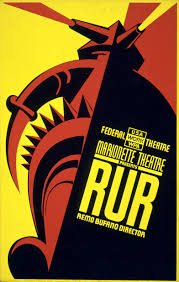 RUR is a short play (86 pages) remembered for introducing the word “robot” into English, way back in 1921. In the story, lifelike robots were servants and laborers so humans never had to work. The robots were called Rossum’s Universal Robots, after their creator.
RUR is a short play (86 pages) remembered for introducing the word “robot” into English, way back in 1921. In the story, lifelike robots were servants and laborers so humans never had to work. The robots were called Rossum’s Universal Robots, after their creator.
Predictably, the robots unionize and revolt against their human masters in armed conflict. What they don’t have, however are Rossum’s original plans, so they are unable to replace themselves and they know they are wearing out. The last remaining humans are unable to re-create the lost plans.
Stalemate then? It’s unclear. The ending is a nonsensical mess.
In the early days of the twentieth century, Ford’s assembly line seemed to be the automated future of work. Assembly line work was mind-numbing and alienating, treating workers as little more than robots. Labor unions were becoming stronger and the communist paradise was just around the corner. World War I had just ended and the horrors of technology were fresh. Remarkably, this short play reflects all those social anxieties.
By today’s standards, the work is clunky, wordy, and overwrought with quaint concerns about the robots’ souls, the moral imperative of biological reproduction and how AI machines should be treated.
But it also anticipated many AI conundrums we still think about such as unintended consequences, whether machines can really think, whether they can be ethical beings, the essential difference between a person and a machine, and whether it would be a mistake to use robots to produce other robots (the so-called “singularity” problem).
I think this book counts as a foundation of psi-fi because it’s really about the humans, not the robots. It asks, who are we going to be in this new technological world that is upon us? That is the essence of psi-fi.
R.U.R. (1921). Karel Capek. Wildsidebooks.com (POD) (86 pp).